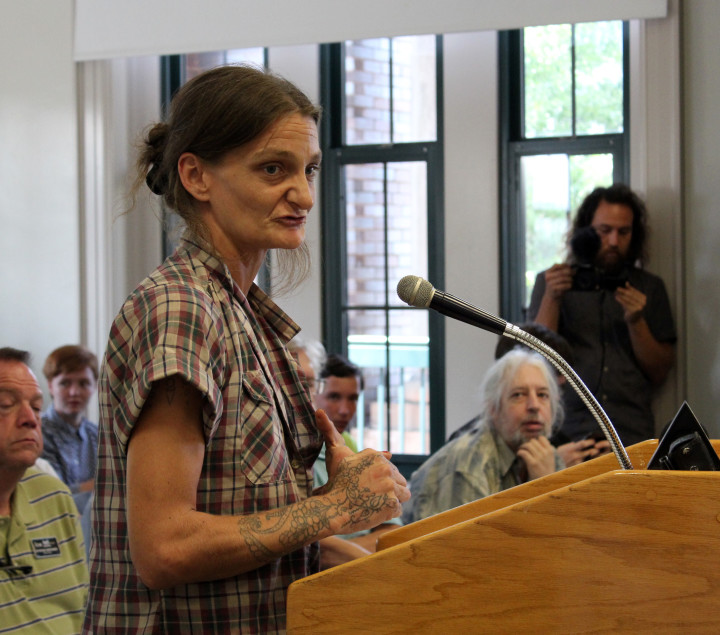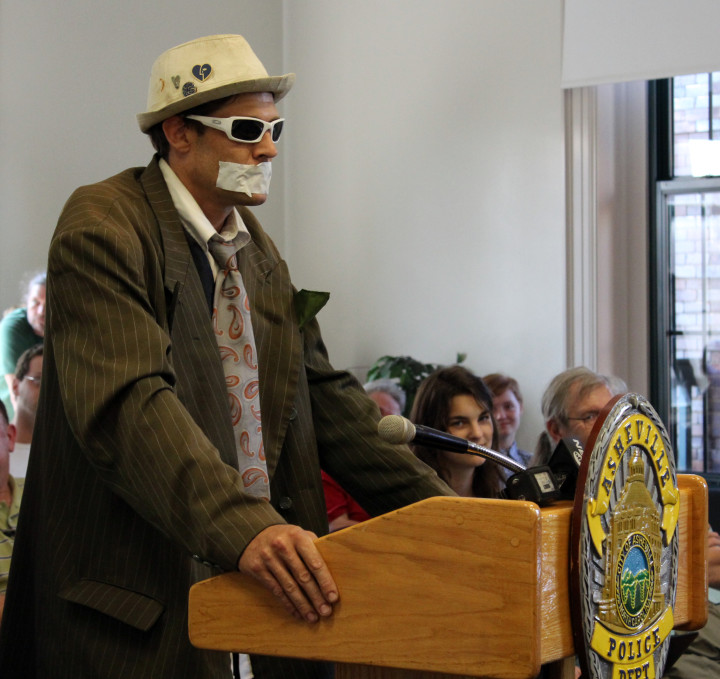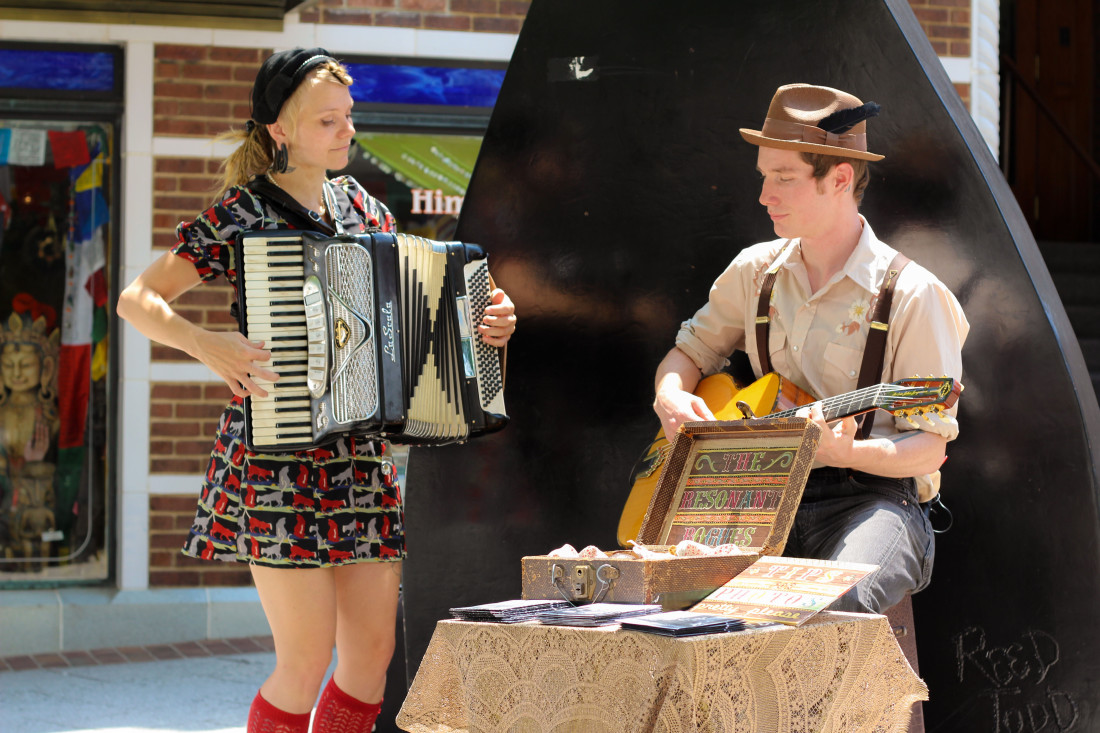The streets and squares of Asheville were quieter than usual on the afternoon of Monday, Aug. 24. Despite brilliant sunshine and pleasant temperatures, some of the city’s best-known street performers had crowded into a meeting room to give City Council members an earful about proposed busking regulations in three high-traffic areas downtown.
Abby Roach, known far and wide as The Spoon Lady, took issue with the city’s process for developing the program, saying that buskers were neither asked for their input nor provided adequate notice of the meeting to discuss the city’s proposal. “This plan was put up at 3:20 [p.m.] on Friday afternoon. Why didn’t you inform us [the Asheville Buskers Collective] so that we could inform our buskers?” she demanded.

Busker Lori Kane agreed, complaining that the staff recommendations “did exactly what you said you wouldn’t do” by developing proposed regulations without input from performers.
In the end, the elected officials instructed city staff to place temporary markings at the designated high impact zones, and to otherwise hold off on implementing the pilot program for now.
Tipping Point?
“Downtown is a place that is very well-loved. Some would say it’s over-loved,” Assistant City Manager Paul Fetherston told Public Safety Committee members Cecil Bothwell, Jan Davis and Chris Pelly. The area has reached a tipping point, Fetherston continued, creating a need for proactive management of public spaces. He called buskers “a welcome and key component of downtown” and a “very popular attraction,” but said their presence must be compatible with public safety and other downtown uses.
Asheville Police Sergeant Jackie Stepp reported that the police department began receiving busking-related complaints in 2013. Overcrowded sidewalks are a big part of the problem, Stepp continued. Pedestrians and buskers share sidewalk space with obstructions such as magazine boxes, mopeds, bicycles, trees, poles and signs. Crowds that gather to watch performances often spill over into the roadway, disrupting the flow of cars and city transit buses.
Many of the busiest busking locations are close to crosswalks and curb cuts for handicap access. “When a crowd forces a person using a wheelchair to travel in the street, that is wrong,” Bothwell said.
Davis added, “The buskers I have watched have had good control of their crowds, but there have been complaints from merchants. If people can’t get into shops or are intimidated, that’s a problem.”
Fetherston introduced the city’s proposed pilot program for three specific high impact locations downtown: outside Woolworth Walk on Haywood Street, at the Flat Iron sculpture at the intersection of Battery Park Avenue and Wall Street and at Pack Square near Rhubarb restaurant.
At Woolworth Walk, the city proposed a 3-by-4-foot marked performance area for a solo performer and all associated equipment. At the Flat Iron, a 5-by-6 space would allow 6 feet of sidewalk passage along all sides of the sculpture. Near Rhubarb restaurant in Pack Square, a 4-by-8 area alongside Biltmore Avenue would be established. No other performers would be allowed within a 100-foot radius around the marked zones.
Had it been approved, the city’s pilot program would have run through August 2016, at which time it would have been re-evaluated.
Boxed in
Pianist Andrew J. Fletcher commented that, from an official perspective, the city’s plan made sense. From an artist’s point of view, however, it doesn’t work. “That’s not how art exists or is created,” he said.
Fletcher, who also plays with The Firecracker Jazz Band, often performs in front of Woolworth Walk, but the proposed size limitation would make that venue off-limits to him. His piano wouldn’t fit within the specified area. “My speech would be restricted,” he said.
Beyond the practical considerations, Fletcher expressed his philosophical objections to the plan: “I don’t like the concept of art in a box. Art exists to destroy boxes and to get people to question things.”

Downtown resident and wheelchair user Sharon Woody bemoaned the character of the proposed changes, saying, “Why can’t we all just live like we want? They are not bothering anybody.”
Virginia Waite, a singer-songwriter and a 20-year busking veteran, also mourned what she saw as a new attitude for Asheville. “This city has always been so open,” she said. “Who wants it to change?”
A seat at the table
In April, Roach recalls, representatives from the Asheville Buskers Collective met with members of the Public Service Committee and the Downtown Association. At that time, according to Roach, there was no mention of boxes, 100-foot zones or other new regulations. That’s why the buskers felt blindsided when a document detailing the proposed pilot program was published on a Friday afternoon, less than one business day in advance of the Monday meeting.
Bothwell responded to the accusations by saying, “This is the first we’ve seen of the plan ourselves.”
Roach, however, rejected that claim, saying that the level of detail in the plan and presentation indicated a planning effort that spanned months and involved multiple city departments.
Chief operating officer of downtown retailer Spiritex Corey Jones said he heard about the proposed changes on Tuesday and expressed concern that the city had not sought input from merchants who would be affected by the plan. “We at least want a seat at the table,” she said. Though Spiritex is supportive of busking, Jones explained, access to the retail store is often blocked by audiences crowding the sidewalk outside its doors. If the Spiritex location was one of the only options for large bands, sales at the local clothing manufacturer’s flagship store could suffer.
Buskers’ concerns
After the conclusion of the public comment portion of the Public Safety Committee meeting, Councilman Pelly said he hadn’t heard any specific objections to the substance of the proposed plan, drawing groans and loud protests from buskers in the crowd.
Roach later summarized some of the buskers’ concerns:
- Limiting the number and location of buskers in downtown’s busiest areas would push performers into different areas, but it wouldn’t solve the problem of overcrowding.
- With Woolworth Walk off limits to all but solo performers and the Flat Iron limited to two, the options for larger groups will be few. Many of Roach’s groups would be limited to Pack Square or in front of Spiritex, increasing the pressure on those areas and the size of crowds there.
- Some types of performers, such as living statues or tarot card readers, combine very well with musical acts. The 100-foot exclusion zone around prime busking areas would unnecessarily restrict these artists’ performance space options.
Roach and many of her fellow buskers say they shouldn’t be asked to bear the full burden of mitigating increased pedestrian traffic in Asheville. Strategies such as converting Wall Street into a pedestrian-only zone or using barricades to keep crowds out of roadways should also be part of the solution. Most of all, according to Roach, the buskers want their voices to be heard as the city develops new policies in response to concerns about the impact of street performers downtown.
Other cities, other streets
Sparrow Pants and Keith Smith of The Resonant Rogues are local musicians who tour extensively in the U.S. and abroad. The pair recently returned from an eight-week European tour, which encompassed 30 shows in seven countries from Istanbul to Ireland. In addition to playing gigs, Pants and Smith busked in 11 of the 12 cities they visited. London was the exception due to its strictly-enforced permit requirement for buskers.
For this tour and others, Pants intentionally selected places that are known as “artistic, creative and free.” Cities with strong busking cultures, Pants says, “rarely have restrictions of any kind” on street performers. In Europe, the duo sold more than 200 CDs on the street and at their shows, which enabled them to break even on the cost of the trip.
“We don’t busk much in Asheville anymore,” said Pants. “Without the ability to sell CDs, it’s usually not worth our time.” When out-of-town musicians visit Asheville, it’s difficult for them to make money here because opportunities for local gigs are limited and the restrictions on CD sales make busking less financially rewarding than in other cities. Pants worries that adding more regulations will discourage talented traveling musicians from visiting Asheville, reducing the creative exchange of musical ideas in the local music scene.
Roach says that Savannah and Boulder have recently passed controls that have “destroyed” those cities’ busking scenes. She loves playing on the streets of Nashville and Knoxville, Tenn., Richmond and Charlottesville, Va. and New Orleans, La., where strong busking cultures and supportive city attitudes still favor street artists.
Aftermath
Though the Public Safety Committee decided to hold off on implementing the pilot program, many Asheville buskers remain on high alert. On Monday night, many took to the Facebook group Asheville Politics to express their dismay with the proposed changes and the process leading up to the public meeting. One thread elicited more than 250 comments between buskers and Councilman Bothwell, with the discussion devolving into name-calling and accusations on both sides.
In one exchange, Bothwell responded to a comment from busker Kane: “As you may have noticed, I made a couple of statements to direct staff to keep the buskers in the loop in the future. There is no frigging ‘damage done.’ What universe do you live in? We agreed to ‘test’ three more limited busking stations in places where pedestrian traffic has been a problem. What in heaven’s name is the ‘damage’ there? You are unreasonable beyond belief.”
The thread was later deleted by an administrator of the Asheville Politics group.
The Asheville Buskers Collective met on Tuesday, Aug. 25 at New Mountain Asheville to discuss their next moves. In addition to stepping up efforts to make the larger community aware of their concerns, the buskers plan to request more information about busking-related complaints received by the Asheville Police Department.
What’s at stake as Asheville grapples with balancing buskers and public safety concerns? For Roach, it’s nothing less than a way of life. “Instead of making it so that performers lose their livelihoods, work with us,” Roach begged the Public Safety Committee. “I love this town, and I don’t want to have to move.”




Great article, thank you. My business is art created from the unique character of Asheville. http://uniquelyasheville.com is a collection of street photographs turned into drawings, paintings, and other interpretive works. The buskers are a critical component of my art. This art has been selling very well at the Kress Emporium. The City of Asheville continues to try to make life difficult for these wonderful people. First it was the harassments of early summer, now it is seeking to sneak in a plan without even including them.
The truth is that these are the very people who bring people downtown. The merchants benefit from them; they are not harmed by them. If the buskers are hassled out of their current ability to perform, it would not only ruin MY business, it would hurt others. I, for one, will not come downtown without buskers free to perform. I will not frequent the places I currently shop. EVERY time I come downtown to see buskers, I eat, drink, and/or shop in merchant places. I have even GIVEN some of my art to some merchants downtown. See my large piece hanging in Pack’s Tavern.
I and my friends will boycott downtown if buskers are pushed from their current venues and forced away from their abilities to perform. And, sadly, I will end up having to close Uniquely Asheville because without buskers, my art business cannot survive.
This seems very anti-artist community to me. What about the crowds on the sidewalk for any Civic Center event, or the large crowds at the Basilica. These are crowds that block the handicap ramps in those areas get blocked anytime there is an event.
So I’m calling “bull-dinky” on this move to limit the street performer community and put them into a lock box.
The situation in New Orleans is not exactly as depicted by Abby Roach. The city appears busker and street performer friendly and accommodating, but this is as the result of decades of litigation, ALL of which was won by the performers. The victories were based on federal law and the application of the Constitution, so there are precedents in place.
Before your politicians start running off at the mouth again, they might want to research this issue. For further assistance, please contact MaCCNO at http://maccno.com/
I was very disappointed to read about the surprise committee meeting. Although I would be considered a tourist, we have been visiting Asheville and making it our only vacation location for over five years. We have visited in March and we have always visited in July and August. We consider Asheville our second home, and plan on making it our permanent home sometime in 2016.
We were in Asheville last month and without getting too wordy, as always, very much enjoyed seeing and hearing buskers. We didn’t see any major public safety issue around buskers, and I agree with the above commenters that buskers help make Asheville what it is. It is interesting that the city has apparently backed away from the noise issue and now focuses on public safety. In my opinion, the noise issue was always a red herring since there is more noise generated by motorcycles, open exhaust systems, etc. than any busker. Last month we didn’t see any significant sidewalk blockage, and in any event, over major week ends, such as July 4th, the sidewalks are totally congested by tourists. I am also fully in favor of buskers being able to sell their CDs, and note that in Fort Lauderdale, this is regularly done, and its done in other locales, as mentioned by other commenters.
Also. the city needs to consider the recent U.S. Supreme Court Decision of REED ET AL. v. TOWN OF GILBERT, ARIZONA which significantly expanded First Amendment rights for all Americans, and that includes buskers.
In summary, the regulation of buskers seems like a solution seeking a problem. Leave things alone.